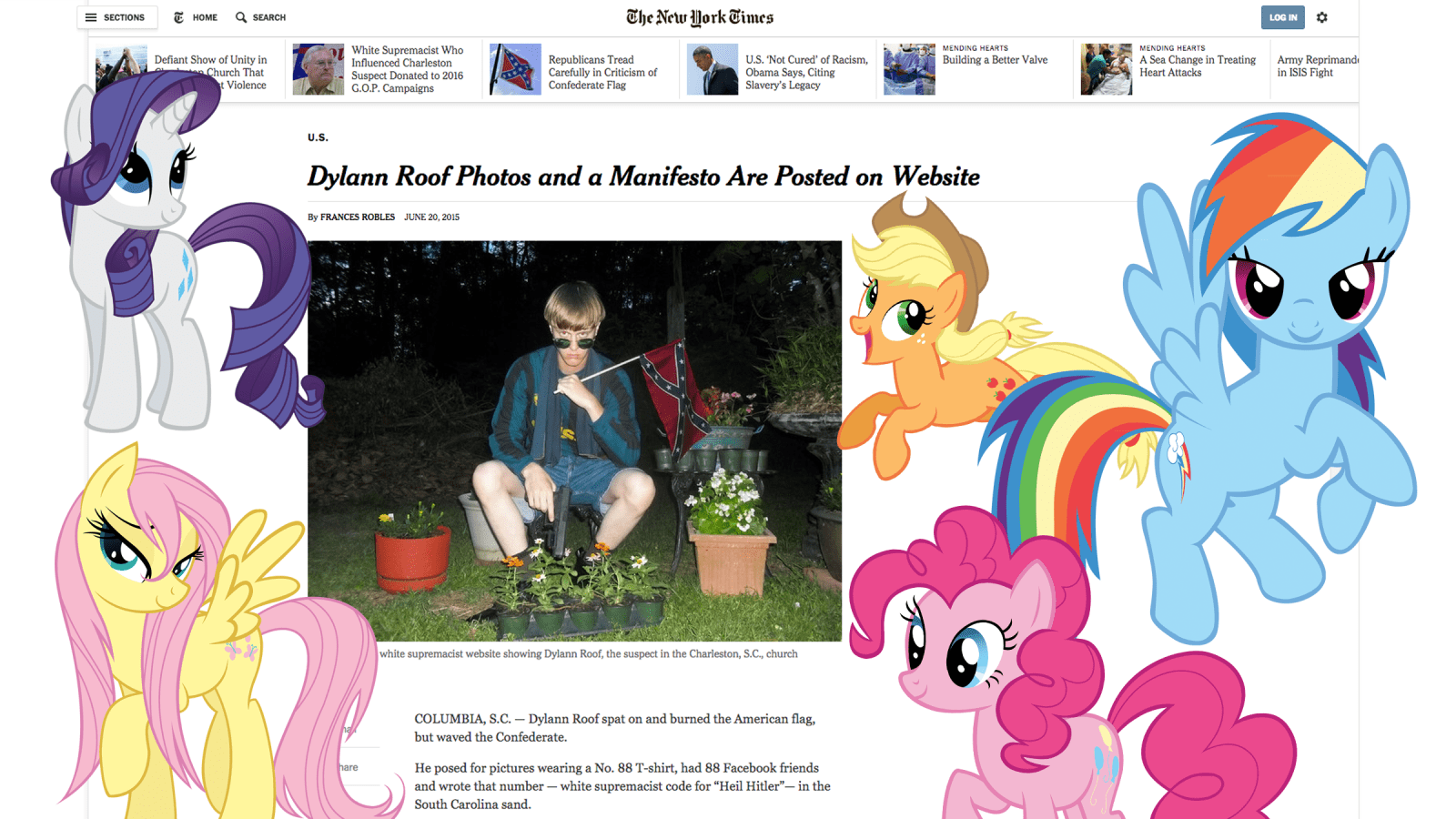Why You (Still) Can’t Believe What You Read in the Papers


Benjamin Wareing, a blogger in Britain, said the writings are nearly identical to blog posts that Mr. Roof posted several months ago on a separate Tumblr page. Mr. Wareing was preparing to write an essay on the dangers of Tumblr and troubled youths, so he took notes on the writings.
“He just made really stupid but obvious statements about people from other races,” Mr. Wareing said in an email. “He would call black citizens ‘nuggets’ and such. He never made direct threats at all on Tumblr, at least it didn’t seem like that, just weird ramblings about how he felt he ‘didn’t fit in.’”
Among his writings were images of 9/11 “memes” and of “My Little Pony,” Mr. Wareing said.
Unfortunately, none of that is true.
It’s the fabrication of a 16-year-old aspiring journalist who wanted to test the gullibility of the NY Times. Wareing wanted to see if the Grey Lady would publish an unverified report without even a basic fact-checking, and somehow he managed to get the hoax published under the byline of a Pulitzer prize-winning journalist (whether or not Frances Robles wrote those paragraphs is another matter entirely).
Those paragraphs were only online for a few hours before being taken down, but not before they were picked up by other publications including the Boston Globe. And in any case, the damage has been done. We now know that the NY Times can be fooled just as easily as anyone else in the news industry.
I wish I could say that I was surprised, but I’m not. I’ve noticed over the past 5 years as a blogger that it is far too easy for an unverified rumor, unconfirmed source, or outright hoax to be published without caveat as fact.
Some of my favorite headline-making hoaxes include a phony quote attributed to French composer Maurice Jarre and used in dozens of versions of his obituary, the Xbox 720, and around half of everything published by the Daily Mail.
That publication is an epic hoaxer who should be reviled for their journalistic standard but appreciated when they reveal who is a gullible fool. As you may recall from the Bruce Willis iTunes inheritance hoax from 2012, the Daily Mail showed us that virtually every online news organization (but not this blogger) could be relied upon to repeat a juicy story without verification.
And this problem is not limited to the news industry; publishing has its own share of hoaxes. The most famous would have to be the Howard Hughes "memoir" by Clifford Irving, but that’s not the only example. There’s also Chris Kyle’s American Sniper, which has been shown to be at least partly fabricated. There have also been several Holocaust memoirs which were later revealed to be hoaxes.
So how do you tell what’s real?
I can’t speak for anyone else, but here’s how I work. I generally start with the assumption that an unverified story is not real, and work from there. I then ask:
- Does the story makes sense?
- Is the source credible?
- Does the source’s explanation for how they got the story make sense?
- Can I verify the details elsewhere?
- Does the source understand what they are discussing, and could that have led them to misinterpret or misunderstand the story?
My system isn’t perfect and it has sometimes lead me to screw up massively, but those questions are why I was the first to doubt the Willis inheritance hoax.
Those questions helped me catch the BBC in an error when they proclaimed that Amazon accounted for half of the UK’s online sales, and I also used those questions to catch The Bookseller in an error when they reported that Amazon had 79% of the UK ebook market (their numbers added up to 130% of the market, so that was an easy one).
I don’t always think to ask all the questions or even the right ones, but the cornerstone of my work ethic is to question everything. It has served me well, and I think that my profession would be much improved if more people adopted that attitude.
Don’t you?

Comments
Russell Phillips June 23, 2015 um 10:35 am
I’ve not felt that I could trust newspapers for years. I really wish I could 🙁 As you’ve shown here, it’s not just the obvious ones that can’t be trusted, but even the ones that have a reputation for trustworthiness.
I’d also add that publishing doesn’t just have a problem with hoaxes, the non-fiction side also suffers from inaccuracies. I seem to see a lot more of them now than I used to, though I’m not sure if that’s because they’re more prevalent or because I’m more aware.
Nate Hoffelder June 23, 2015 um 3:10 pm
Yes, Vulture had a piece on fact-checking just this morning. That tells you how bad things have gotten; the public has noticed the industry’s dirty laundry.
fjtorres June 23, 2015 um 10:40 am
I am not the only one who can say this:
Every time the mass media covers material that I am professionally competent to judge, they get it wrong in one way or another.
Every.
Single.
Time.
Bridget McKenna June 23, 2015 um 1:45 pm
"Can I verify the details elsewhere?"
When the NYT skips that step, journalism is hanging on by a thread.
Jack June 23, 2015 um 4:59 pm
To be fair, it’s not true that "none of that is true." The quoted section clearly says that those are Wareing’s claims, and there’s no reason to believe that they aren’t. Still, I don’t think it’d be good policy at the New York Times to publish whatever nonsense someone emails to them, except perhaps in the letters to the editor section.
kariss June 24, 2015 um 4:19 am
I think the word 'hoax' is wrong in these instances, they are just strait up lies!
Parody News Site Squats on NY Times Domain, Proves Power of Branding Over Common Sense | Ink, Bits, & Pixels June 29, 2015 um 9:26 am
[…] I reported last week, one can't always trust what one reads in the news. We need to doubt and question all news stories otherwise we would be […]